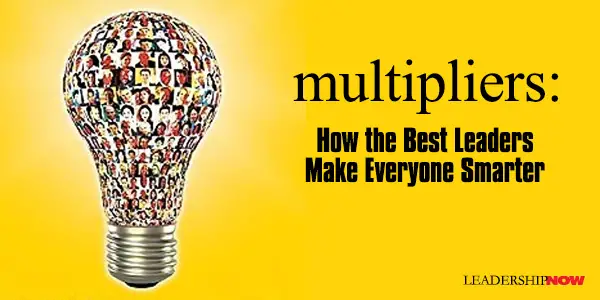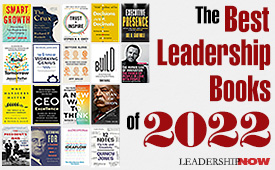 |
 |
06.29.10

Multipliers: How the Best Leaders Make Everyone Smarter
MUCH OF WHAT constitutes good leadership can be summarized in two words: respect and selflessness. How we relate to those two words will determine how we lead. Consider two assumptions that lie at the opposite ends of the spectrum: • Really intelligent people are a rare breed and I am one of the few really smart people. People will never be able to figure things out without me. I need to have all the answers. • Smart people are everywhere and will figure things out and get even smarter in the process. My job is to ask the right questions. What you believe has a big impact on the performance, engagement, loyalty and the transparency you find with those you lead and interact with. In Multipliers: How the Best Leaders Make Everyone Smarter, authors Liz Wiseman and Greg McKeown refer to those with the mindset represented by the first assumption as Diminshers and those with the mindset represented by the second assumption as Multipliers. It explains why some leaders create intelligence around them, while others diminish it. The value of Multipliers is that is shows what these assumptions about people look like in practice and how they are reflected in your behavior. How would you approach your job differently if you believed that people are smart and can figure it out? With a Multiplier mindset, people will surprise you. They will give more. You will learn more. What kind of solutions could we generate if you could access the underutilized brainpower in the world? How much more could you accomplish? It’s not that Diminishers don’t get things done. They do. It’s just that the people around them feel drained, overworked and underutilized. Some leaders seem to drain the “intelligence and capability out of the people around them. Their focus on their own intelligence and their resolve to be the smartest person in the room [has] a diminishing effect on everyone else. For them to look smart, other people had to end up looking dumb.” In short, Diminishers are absorbed in their own intelligence, stifle others, and deplete the organization of crucial intelligence and capability. Multipliers get more done by leveraging (using more) of the intelligence and capabilities of the people around them. They respect others. “Multipliers are leaders who look beyond their own genius and focus their energy on extracting and extending the genius of others.” These are not “feel good” leaders. “They are tough and exacting managers who see a lot of capacity in others and want to utilize that potential to the fullest.” The authors have identified five key behaviors or disciplines that distinguish Multipliers from Diminishers. You are not either/or but are somewhere along a continuum. These are all learned behaviors and have everything to do with how you view people. We don’t have to be great in all disciplines to be a Multiplier, but we have to be at least neutral in those disciplines we struggle with.
They have developed an assessment tool you can use to see where you are. Importantly, the first place to begin is with your assumptions about people. If you don’t have that straight the rest is just manipulation. As with most behaviors, we do them because we feel we have to. They are self-perpetuating. We jump in where we shouldn’t and come to the rescue. Under our “help” (domination) people hold back thereby reaffirming our belief that they just couldn’t do it without us. And they can’t or rather won’t. Instead they quit while still working for us or move on. We see this in ourselves, in others and in organizations of all types. Leaders are especially prone to run over people, because after all, they have the vision, the know-how and the desire to get it done. We have to slow down and remember that we are not there just to get the job done, but to develop others to get the job done. They can (and need to be able to) do it without us. It’s our job to show them how. In many ways, as leaders, we can become accidental Diminishers. The skills that got us into a position of leadership, are not the same skills we need to lead. Leadership requires a shift in our thinking. Wiseman and McKeown write, “Most of the Diminishers had grown up praised for their personal intelligence and had moved up the management ranks on account of personal—and often intellectual—merit. When they become ‘the boss,’ they assumed it was their job to be the smartest and to manage a set of ‘subordinates.’" Here are some thoughts—out of context—from the book that will get you thinking: “Marguerite is so capable she could do virtually any aspect of girl’s camp herself.” But what is interesting about Marguerite isn’t that she could—it is that she doesn’t. Instead, she leads like a Multiplier, invoking brilliance and dedication in the other fifty-nine leaders who make this camp a reality. One leader had a sign on her door: “Ignore me as needed to get your job done.” She told new staff members, “Yes, there will be a few times when I get agitated because I would have done it differently, but I’ll get over it. I’d rather you trust your judgment, keep moving, and get the job done.” The path of least resistance for most smart, driven leaders is to become a Tyrant. Even Michael said, “it’s not like it isn’t tempting to be tyrannical when you can.” Policies—established to create order—often unintentionally keep people from thinking. At best, these policies limit intellectual range of motion as they straitjacket the thinking of the followers. At worst these systems shut down thinking entirely. “It is just easier to hold back and let Kate do the thinking.” [They resign: “Whatever!”] It is a small victory to create space for others to contribute. But it is a huge victory to maintain that space and resist the temptation to jump back in and consume it yourself. An unsafe environment yields only the safest ideas. [Multipliers] ask questions so immense that people can’t answer them based on their current knowledge or where they currently stand. To answer these questions, the organization must learn. His greatest value was not his intelligence, but how he invested his intelligence in others. 
Posted by Michael McKinney at 04:28 PM
|
BUILD YOUR KNOWLEDGE


How to Do Your Start-Up Right STRAIGHT TALK FOR START-UPS 
Grow Your Leadership Skills NEW AND UPCOMING LEADERSHIP BOOKS 
Leadership Minute BITE-SIZE CONCEPTS YOU CAN CHEW ON 
Classic Leadership Books BOOKS TO READ BEFORE YOU LEAD |
|||||||||||||||||||||||||||